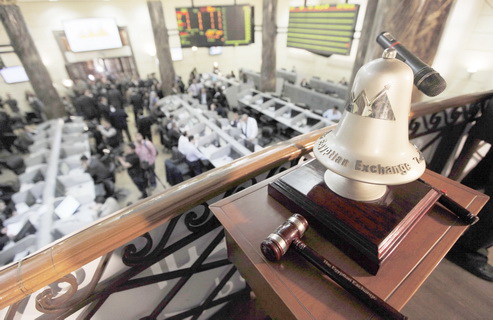The Arab Petroleum Investments Corporation (APICORP), a multilateral development bank owned by the 10 member states of the Organization of Arab Petroleum Exporting Countries (OAPEC), announced its first divestment Tuesday, signing an agreement to sell its 12 percent stake in the Egypt-based Alexandria Carbon Black Company (ACBC) to the Aditya Birla Group, the majority shareholder of the company.
“The agreement is further evidence of the rapid divestment potential of our investments. This sale is part of an investment strategy to redeploy funds for diversification into new midstream sectors, particularly oil refining, storage, transport and shipping,” said Ahmad Bin Hamad Al-Nuaimi, chief executive and general manager of APICORP.
APICORP is a multilateral bank created in 1975 and has a mandate to assist the development of member states’ hydrocarbon sectors through project loans, trade finance and direct equity investments.
The government of Egypt has a 3 percent stake in APICORP.
Other shareholders include Saudi Arabia (17 percent), the United Arab Emirates (17 percent), Kuwait (17 percent), Libya (15 percent), Iraq (10 percent), Qatar (10 percent), Algeria (5 percent), Bahrain (3 percent), and Syria (3 percent).
The bank held total assets of $4.3 billion at the end of June 2010 and, according to a press statement released by the bank, it enjoys a risk-weighted capital adequacy ratio of 26.4 percent — one of the highest among A-rated commercial banks in Saudi Arabia and GCC. APICORP has a leverage ratio of 3.1 percent and a non-performing loan ratio of 0.7 percent.
The sale of the stake in ACBC was part of a series of decisions that were set into motion in September after the bank announced it was planning to issue a Saudi Arabian Riyal (SAR)-denominated benchmark-sized bond to raise funds for expanding the organization’s equity and loan portfolios.
Commenting on his expectations of the loan, Al-Nuaimi expected a highly positive response to the bond issue from investors, citing APICORP’s exceptional credit and stakeholder profiles, solid balance sheet, low leverage, sound loan quality, high capital adequacy, and profitable track record as reasons for his bullish predictions.
By October, the bank’s SAR 2 billion bond debut was oversubscribed three times, achieving an aggregate book size of SAR 6 billion ($1.6 billion). According to a press statement released by the bank, the SAR bond was rated A1 by Moody’s, thereby marking the first time this was achieved in the Kingdom by a Multilateral Development Bank.
The issuance was coordinated by Crédit Agricole Corporate and Investment Bank and the joint lead managers and book runners, Calyon Saudi Fransi Limited; GIB Financial Services LLC; HSBC Saudi Arabia Limited; and Samba Capital & Investment Management Company Limited.
Commenting further about the bond’s success, Al-Nuaimi said “the enthusiastic and swift response from risk-averse, sophisticated investors is a testament to our sound and compelling route-to-market strategy.”
He added that, historically, APICORP always succeeded in securing competitive financing due to its impressive credit profile, but added that the performance of the bond has been “unprecedented” and that the “bank was highly encouraged by the endorsement from the investor community.”
The proceeds of the bond, according to Al-Nuaimi, would be used to further strengthen the bank’s financing and equity portfolio for its new plan to invest in the region’s oil and gas industry, which he said has an estimated investment potential of $615 billion.
The bank’s first major investment as part of this new plan came in November with the signing of a $93 million medium-term loan agreements in favor of Arab Maritime Petroleum Transport Company (AMPTC). APICORP announced that the proceeds of the loan would be utilized to partly finance AMPTC’s acquisition of two Aframax oil product tankers.
“Despite today’s difficult financing conditions, over the last few months we have participated in financing transactions in the petroleum and petrochemical sector with a total value of $9 billion, with APICORP’s commitments approximating $213 million,” said Al-Nuaimi.
This week’s ACBC divestment came after Al-Nuaimi had revealed in September that APICORP is currently in advanced negotiations to divest two of its key equity stakes in oil and gas companies.
“These two investments are extremely viable, and it now makes sense that the assets go to owners seeking quality oil and gas investments that are relatively liquid while APICORP employs the sale proceeds to help develop new projects,” he said.
Commenting specifically on the ACBC divestment, Al-Nuaimi said “the goal of each of our investments is to support our investee company in reaching a level of business stability and operational maturity from which it can sustainably accelerate its development.
“Since we invested in ACBC 17 years ago, we have seen the company evolve into the world’s largest production line in the carbon black industry and we now feel it is the right time to monetize the investment. We wish ACBC every success in continuing its exceptional growth story,” he added.
“Encouraged by the strong backing of our board; the energy industry’s pivotal role in economic revival and the high first-time issuer credit rating we received from Moody’s, we feel it is an opportune time to initiate divestments and enter new ones that further diversify our oil and gas investment portfolio.”



